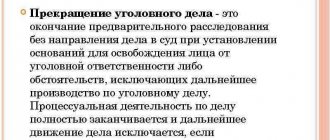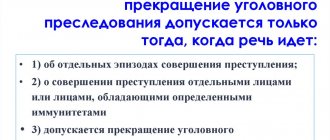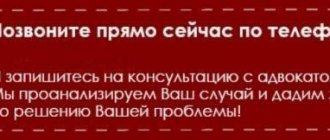Seizure of property in a criminal case
Currently, such a measure of procedural coercion as the seizure of property is widely used (Article 11 of the Code of Criminal Procedure of the Russian Federation). Unfortunately, it is also one of the most problematic, giving rise to numerous abuses by investigative bodies. The application of such a measure may entail an unjustified restriction of the constitutional rights to the inviolability of private property and the free use of one’s property for business and other economic activities. And it happens that this measure is, in fact, used as a “method of pressure” in criminal proceedings, which, naturally, does not meet its purpose.
Within the framework of this article, it is impossible to describe all the legal subtleties and problems of applying seizure of property, but let me draw the reader’s attention to a number of circumstances.
The Code of Criminal Procedure of the Russian Federation requires that the court decision on arrest (on its extension) indicate “specific, factual circumstances on the basis of which the court made such a decision.” But this can be understood as the need to argue that there are grounds to believe that this property was obtained as a result of a crime or was used as an instrument of crime, to finance criminal activities, etc. Russian law enforcement practice followed the path of precisely this interpretation. As a result, orders to seize property are very stingy in providing specific justification for the need for its imposition.
A typical example. The court arrested the bank accounts of a number of legal entities on the basis of the following documents: decisions to initiate a criminal case and to conduct a preliminary investigation by the investigative team, a decision to conduct a search and its protocol, “reports, certificates of examination of documents... requests and answers of an informational nature, in particular about numbers of current accounts opened by legal entities.” It is clear that all these documents were of a formal nature, and none of them specifically confirmed the investigation’s version that funds obtained through illegal banking activities were credited to the seized accounts (on the basis of which the seizure was imposed). However, this did not prevent the court of first instance from granting the request for seizure, and although the appellate court overturned this decision, pointing out an unreasonable and excessive restriction of property rights and freedom of entrepreneurial and other economic activity, such an outcome of the case is the exception rather than the rule.
As for the specification of the seized property , it can be carried out both in the court ruling itself and later, in the protocol drawn up by the investigator or interrogating officer. The court may limit itself to indicating whose property is being seized and for what amount.
In the same way, at the discretion of the inquiry officer or investigator, the issue of storage of seized property is decided: whether it will be left in the custody of the owner or possessor, transferred to another person, or seized for storage in a criminal case (Part 6 of Article 11 of the Code of Criminal Procedure of the Russian Federation). Thus, the law does not in any way limit the discretion of the law enforcement officer in this matter. Meanwhile, this or that decision may be of no small importance for the property owner. And this uncertainty remains despite the fact that the European Court of Human Rights drew attention to the importance of this issue of the possibility of leaving seized property with the owner, for example, in the case “Borzhonov v. Russia” (paragraph 61 of the Resolution of January 22, 2009; complaint No. 18274/04).
The law provided for the need to indicate in the decree on the seizure of property the specific restrictions imposed . However, in practice, they are often formulated as broadly as possible, or the registering authorities often ignore this list, making only a general entry about the seizure of property. Thus, in one of the cases, the Federal Registration Service for the Moscow Region reflected the imposed pursuant to Art. 11 of the Code of Criminal Procedure of the Russian Federation “arrest in the form of a prohibition on the owner to carry out transactions the subject of which is a sale or other alienation” simply as an arrest, as a result of which the owner was deprived of the opportunity to register lease agreements in relation to his property. It is noteworthy that in this case, the Federal Registration Service made a request to the preliminary investigation authorities, to which they received a response that any registration actions in relation to the object were inadmissible.
One of the latest innovations in the practice of the Constitutional Court of the Russian Federation is Resolution No. 18-P of April 17, 2022, by which the court assessed the constitutionality of part one of article, part one of article 299 and article 307 of the Criminal Procedure Code of the Russian Federation.
The contested provisions regulate the circumstances to be proven in criminal proceedings, issues resolved by the court when rendering a verdict, as well as the content of the descriptive and motivational part of the guilty verdict.
These provisions were the subject of consideration insofar as on their basis the court verdict decides the issue of preserving, after the verdict enters into legal force, a seizure imposed in the framework of criminal proceedings on the property of a person who is not the accused or a person legally liable for his actions. , in order to secure a civil claim.
The Constitutional Court recognized the challenged provisions as inconsistent with the Constitution of the Russian Federation. In pursuance of this Resolution of the Constitutional Court of the Russian Federation, on December 17, 2019, the State Duma of the Federal Assembly of the Russian Federation adopted in the first reading a bill on the period for arresting the property of a third party in a criminal case.
For legal assistance, please contact:
- 8-909-392-34-24 (WhatsApp, Viber, Telegram, Signal)
- 800-101-55-04 (Free call within Russia)
Email address for correspondence: [email protected]
Whose property can be seized?
When conducting a criminal case, property located in the possession of the person suspected of committing a crime, as well as in the person financially responsible for his actions, may be seized:
- at the employer of the suspected or accused person (Article 1068 of the Criminal Code );
- financial authorities that are responsible for the actions of an official ( Articles 1069-1071 of the Civil Code );
- from legal representatives of persons recognized as not fully capable (Articles 1074 and 1077 of the Civil Code);
- owners of sources of increased danger (Article 1079 of the Civil Code of the Russian Federation) and others.
According to the provisions of Article 54 of the Code of Criminal Procedure, these persons can be recognized as defendants in a civil suit, and as accomplices in a crime they are jointly and severally liable. Moreover, the proportions of property sanctions can be any, and their total cost is no more than the amount of possible recovery.
The Code of Criminal Procedure (part three of Article 115) states that property held by a third party may be seized if there are sufficient grounds to believe that the suspect or accused obtained it through criminal means. Either he used it (he intended to do this) as a weapon for a crime, or he used it to finance terrorism, an illegal military group.
Comments on the article
In Part 1 of Art. 115 of the Code of Criminal Procedure of the Russian Federation describes the need to confirm the validity of the seizure of property, but sometimes even if there are such factual grounds, they cannot confiscate or seize material assets. If the accused owns an apartment where his family and minor children live, and they no longer have a suitable place to live, then it is not subject to confiscation. An exception is the situation in which this is the only housing that is in a mortgage loan, then it can be foreclosed on.
Also not subject to arrest:
- land plots on which the only real estate suitable for living is located;
- personal items (shoes, clothes);
- property necessary for professional activities, for example, a computer programmer;
- property not intended for business activities, but generating profit, for example, food for pets and buildings for their maintenance;
- seeds for the upcoming sowing, even if this is a business activity (if the accused is a farmer);
- cash and food products set at the subsistence level;
- means of transport and other property necessary for the accused if he is disabled;
- prizes, state awards and gifts that are awarded to the accused for his services.
The list of property subject to confiscation is approved by federal laws. During the confiscation process, independent expert appraisers must be present, as well as witnesses, whose names are also included in the protocol. The defendant’s lawyer may also be present at the arrest, who will monitor the legality of the inventory of property.
In the absence of the owner of the property, the arrest is not carried out, with the exception of cases of an urgent nature, that is, when there is a likelihood that the culprit will destroy or sell the illegally obtained property.
In this situation, the investigator submits a petition to the judge to issue a special warrant, and on its basis, the property is seized, even without the consent of the owner and his presence.
What is the procedure for seizing property?
the right to impose arrest in Russia , as stated in the Code of Criminal Procedure (the ninth paragraph of the second part of Article 29). According to the third part of Art. 35. According to the Constitution of the Russian Federation, a citizen can be deprived of his property in our country only if such a decision is made by a court.
If the owner took possession of the property after committing a crime, it is subject to signs of material evidence, which can be found out in paragraph 2.1 of part 1 of Art. 81. Code of Criminal Procedure. And its seizure is carried out during investigative actions - during a search, seizure, inspection. This is followed by arrest.
Courts consider requests from investigative authorities to seize the property of third parties according to the standard scheme. The procedure is the same as when issuing court sanctions for investigative actions: it is stipulated in Art. 165 Code of Criminal Procedure.
The period for a single judge to make a decision should not exceed 24 hours from the moment he received the petition. The judge must provide reasons for his decision, while the factual circumstances must be outlined and restrictions on the ownership, use and disposal of property must be established.
However, there are situations when property can be seized without a court decision. In this case, we are talking about an immediate arrest, which is carried out by the inquiry officer or investigator. They are obliged to inform the judge and the prosecutor about this no later than 24 hours later. Then, within the same period, the judge must issue a resolution stating whether these investigative actions are legal or not and indicating the circumstances on the basis of which the property was seized. A copy of the resolution must be given to the civil plaintiff if he applies to the court with such a request.
On what basis is an arrest imposed?
The basis is a reasonable assumption that, if property is not seized, it may be impossible or difficulties will arise to execute the sentence in a criminal case in terms of collection of the property plan.
By law, at least one of the following conditions must be present.
- If it is established that the victim was caused moral or property damage by the accused, and the victim filed a civil claim in court.
- If law enforcement agencies have evidence of illegal acquisition of property, which, under Article 104 of the Criminal Code, can be confiscated, including income from criminally obtained property.
- If the property was used in the financing of terrorism, a criminal organization, an illegal military group, or was also an instrument of crime.
- If part of the legal costs in a criminal case may be assigned to the accused person (Articles 131 and 132 of the Criminal Code) or a monetary penalty may be imposed on his legal representatives (Articles 117 and 118 of the Criminal Code).
When a court imposes sanctions, its decision must list the reasons for this, and also spell out exactly how the owner’s ability to own, use and dispose of the property is limited.
Seizure of property and terms
The court's decision must include the period for which sanctions are imposed, as specified in the Code of Criminal Procedure. If a decision is made to seize the property of a person who is not a suspect, the terms must be determined on the principles of reasonableness. They are stipulated in the amendments introduced to the Code of Criminal Procedure dated September 15, 2015.
The court must take into account the total duration of the sanctions and other circumstances indicated in Part 3.2 of Art. 6.1 Code of Criminal Procedure. This includes the complexity of the criminal case – both factually and legally. The behavior of persons participating in legal proceedings and the total duration of legal proceedings in a criminal case are taken into account; and also how sufficient and effective the actions of the investigative and judicial authorities are.
The terms of seizure may be extended, and the persons whose property was seized may take part in this procedure. In this case, the investigator or inquiry officer has the obligation to provide the court with documents indicating the preservation of the grounds.
When a criminal case is suspended, the inquiry officer or investigator needs to decide whether to extend the deadline. The judge can cancel the arrest or extend it. At the same time, the content of the coercive measure changes - the court is only allowed to prohibit the destruction or alienation of property, but not to use it.
If the deadlines are extended, the court is obliged to notify the third party – the owner – about this. The decision can be appealed by filing an appeal to a higher court.
Arbitrage practice
In dissertations and legal literature, the use of the article is described quite often, since it is actively used by investigators in cases where the imposition of restrictive measures takes place.
An example is the following case: citizen Pospelov illegally cut down trees for a total amount of 123 thousand rubles. This amount is large, and, therefore, a criminal case was opened under Art. 260, part 2 of the Criminal Code of the Russian Federation.
During the criminal case, a petition was filed to impose interim measures on a car belonging to the culprit in a civil claim for compensation for damage caused to forestry.
Pospelov:
- admitted his guilt completely;
- contributed to solving the case;
- has mitigating circumstances in the form of having dependent young children.
Therefore, he received a mild punishment. He was given a recognizance not to leave. Evidence was presented to the court that the defendant has a car registered in his name. This allowed the judge to apply Art. 115 of the Code of Criminal Procedure of the Russian Federation and impose interim measures, expressed in the seizure of the vehicle, which will remain in effect until the repayment of the amount awarded in the civil claim.
This measure is often mentioned in cases where the use of bail is possible. The new version of the article implies the release of the culprit on bail, while the measures taken by the investigation to preserve the full amount of property are not canceled until a court decision
Are stolen funds considered evidence?
To find ways to resolve the described problem, it is also necessary to understand whether these funds stolen from the Company can be material evidence in a criminal case.
Let us turn again to the Code of Criminal Procedure of the Russian Federation.
Thus, the definition of material evidence, as well as the procedure for recognizing objects as such, is enshrined in Article 81 of the Code of Criminal Procedure of the Russian Federation.
As follows from the analysis of this article of the Code of Criminal Procedure of the Russian Federation, funds in a bank account are not physical objects, do not have any identification marks or physical properties, and, as a result, cannot be recognized as material evidence in a criminal case. In contrast, for example, to cash in banknotes or currency, which can be recognized as material evidence in a criminal case in accordance with the procedure established by Article 81 of the Code of Criminal Procedure of the Russian Federation.
Law enforcement officials also adhere to the point of view described above when carrying out a preliminary investigation, and therefore non-cash funds in bank accounts are never recognized as material evidence.
Thus, the above legal norms relating to the seizure of property and funds are applied in this case without taking into account the provisions regulating the issues of recognition, recording and storage of material evidence in a criminal case.
All of the above has a significant role in the question of how to return stolen funds to their rightful owner before the criminal case is resolved on its merits.







